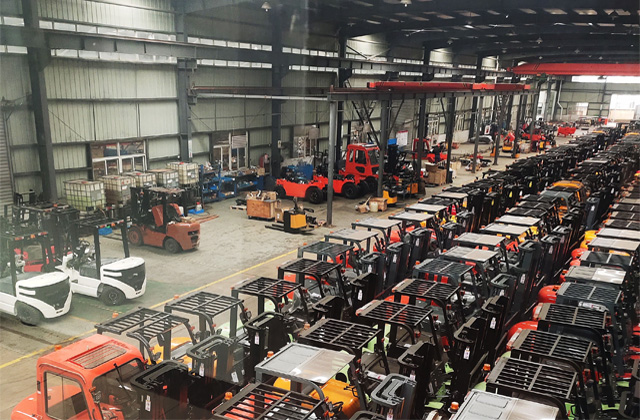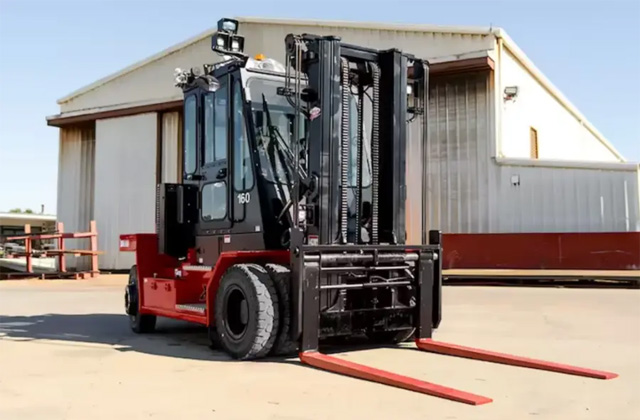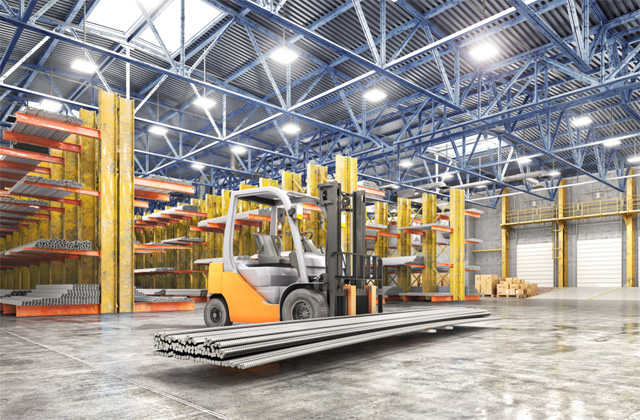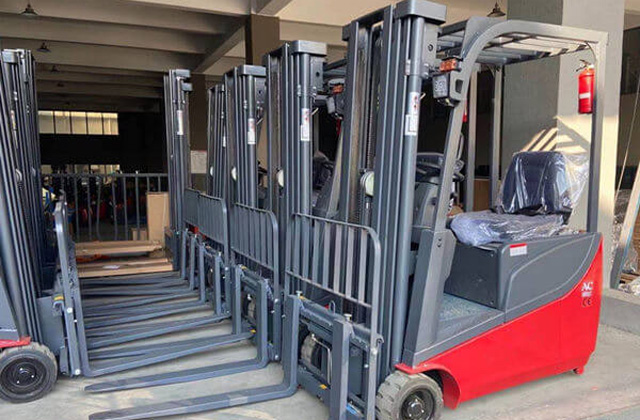Today, as industrial manufacturing is fully upgraded, forklifts are not only "carriers" for warehousing and logistics, but also key hubs in the intelligent manufacturing chain. As an important part of the global manufacturing system, China's forklift industry is gradually getting rid of the label of "manufacturing power" and moving towards "manufacturing power". From traditional machinery to intelligent forklifts, from parts assembly to self-developed technology, Chinese forklift manufacturers are ushering in an unprecedented golden age.

1. Overview of China's forklift industry: from imitation to independent innovation
1.1 Starting period: from "copycat" to standardization
China's forklift manufacturing started late. In the 1980s, the domestic forklift industry was almost monopolized by foreign brands, and most early manufacturers relied on imitating foreign models to obtain initial technical accumulation. At that time, the "product is copy" model prevailed, but it also planted the seeds for subsequent industrial upgrading.
1.2 Development period: the rise of local brands
Entering the 21st century, especially after the "12th Five-Year Plan", the Chinese government vigorously promoted the localization of industrial equipment, giving birth to a number of local forklift brands. Keywords such as technology research and development, automated manufacturing system, and intelligent control have gradually appeared in the strategic planning of major manufacturers, and forklift industry clusters such as Anhui, Zhejiang, Jiangsu, and Fujian have gradually formed.
1.3 Intelligent period: moving towards "intelligent manufacturing"
In recent years, with the promotion of Industry 4.0, intelligent manufacturing, and green manufacturing concepts, the domestic forklift industry has begun to upgrade comprehensively. Traditional internal combustion forklifts have given way to electric forklifts and hydrogen forklifts, and AGVs (automatic guided vehicles) and unmanned forklifts have gradually entered mainstream factories and large logistics parks.
2. Technological innovation: Forklifts are not just "labor work"
2.1 Electrification: The main battlefield of green transformation
Compared with traditional internal combustion forklifts, electric forklifts are rapidly occupying the market due to their environmental protection, low noise, and low maintenance costs. At present, major Chinese forklift manufacturers have made breakthroughs in lithium batteries, electronic control systems, and fast charging technologies. Among them, the many electric counterbalanced forklifts launched by Shuangchao Machinery are very popular in the market because of their stable endurance and strong power.
For example, Shuangchao Machinery's latest "SC-Power E Series" lithium-ion forklift adopts a modular electronic control design, which can quickly adapt to different working conditions and can operate stably between -20°C and 40°C. Its intelligent thermal management system allows users to use it without worries even in cold warehouses or hot docks.
2.2 Intelligence: AI-enabled forklift "brain"
Forklift automation originated from the control of "driver costs", but now the biggest selling point of smart forklifts is no longer labor saving, but collaborative operation, data networking and flexible scheduling. In this field, domestic brands are no longer lagging behind.
The "SCVision Intelligent Control System" jointly developed by Shuangchao Machinery and several universities in 2024 has achieved a high degree of integration of AI visual positioning and dynamic obstacle avoidance, allowing forklifts to not only "see", but also "think, predict, and execute". Compared with traditional navigation AGVs, SCVision has many intelligent functions such as autonomous path optimization and parallel task execution, which greatly improves the handling efficiency of industrial parks.
2.3 Multi-energy drive: hydrogen and hybrid forklifts are gradually emerging
With the advancement of the national strategy of "carbon peak and carbon neutrality", hydrogen forklifts are favored by more and more manufacturers. Some Chinese companies have carried out small-scale production tests of hydrogen fuel cell forklifts, and it is expected that they will be gradually commercialized in the next three to five years. Shuangchao Machinery has now completed the trial operation of its first hydrogen prototype vehicle, with a battery life of up to 8 hours and a hydrogen charging time of less than 5 minutes, marking a key step in its green transformation roadmap.
3. Market structure: Chinese brands are going global
3.1 The domestic competition landscape is becoming more mature
At present, China's major forklift brands can be divided into three categories:
Traditional state-owned enterprise background manufacturers: such as Hangzhou Forklift and Heli Forklift, which have deep accumulation in scale, channels, and product systems.
Private technology manufacturers: such as Shuangchao Machinery, Noli Co., Ltd., and Hangcha Group, quickly won the market with their R&D capabilities and flexible manufacturing systems.
Emerging intelligent brands: start-up technology companies with "intelligence + new energy" as their selling point, such as Qinglang and Future Forklift.
Among them, Shuangchao Machinery has established a stable cooperation network in multiple industries (manufacturing, cold chain, medicine, and retail) with high cost-effectiveness, technical upgradeability, and flexible customization services, and customer satisfaction has always been high.
3.2 The pace of going overseas is accelerating, and "Made in China" is showing its sword to the world
In the past, Chinese forklifts were mainly exported for OEM, with meager profits. But now, more and more companies are entering the European, American, Middle Eastern, and Southeast Asian markets with their own brands. Chinese brands frequently appear at large international forklift exhibitions. Since 2022, Shuangchao Machinery has exported its new energy forklift series to Germany, Poland, Vietnam, and the United Arab Emirates, and successfully established a local after-sales service team to achieve true brand going overseas.
4. Continuous expansion of application scenarios: not just "Iron Man" in the warehouse
4.1 Manufacturing workshop: the central nervous system of lean production
Under the concept of lean manufacturing, forklifts are no longer just "transportation tools", but data units linked to the MES system (manufacturing execution system). Smart forklifts can provide real-time feedback on task execution, path status, and load information, providing key data for efficiency optimization of the entire workshop.
4.2 E-commerce logistics: the last 100 meters from warehouse to home
With the rise of the "instant delivery economy", logistics warehousing faces more frequent handling needs. Small electric forklifts and unmanned navigation pallet trucks have become rigid needs for express delivery companies. In this regard, the "FlexMove" series launched by Shuangchao Machinery is specially designed for warehousing and logistics scenarios. Its flexible turning radius and automatic path avoidance technology have won praise from cooperative customers such as JD Logistics and SF Supply Chain.
4.3 Special scenarios: cold storage, high temperature, and high corrosion environment
The "adaptability" of forklifts is determining their survival space in the subdivided industry. Shuangchao Machinery provides customized solutions in this subdivided field. For example, it provides corrosion-resistant cold storage forklifts for food processing companies, which are suitable for low-temperature starting systems and stainless steel bodies; it provides explosion-proof design models for chemical plants, in line with national safety certification standards.
5. Shuangchao Machinery's Intelligent Manufacturing Road
When it comes to China's local powerful forklift companies, we have to mention "Shuangchao Machinery". As a company that has been deeply involved in the forklift industry for many years, Shuangchao Machinery has always adhered to the concept of "intelligent drive, quality first", and has transformed from a single manufacturer to a full-scenario intelligent handling solution provider.
The core advantages are as follows:
Full product line coverage: covering more than 20 series such as electric forklifts, off-road forklifts, unmanned forklifts, stackers, pallet trucks, etc.
Technology-driven strategy: a total of 30+ national patents have been obtained, and participated in the formulation of many industry standards.
Intelligent system integration: It has an independently developed scheduling platform and digital twin system, which supports multi-model linkage management.
High-quality service system: There are 70+ service outlets across the country, with a response time of less than 8 hours and an after-sales satisfaction rate of up to 96%.
While Shuangchao Machinery is constantly promoting the "intelligent manufacturing" of forklifts, it has also become a microcosm of the "qualitative change" of China's manufacturing.
Although the forklift is small, it connects the "capillaries" of the entire industrial society. Chinese forklift manufacturers are accelerating in transformation, upgrading and innovation at a visible speed. In particular, technology-based private enterprises represented by Shuangchao Machinery have not only taken up the banner of domestic substitution, but also won real respect for "Made in China" in the global market.



